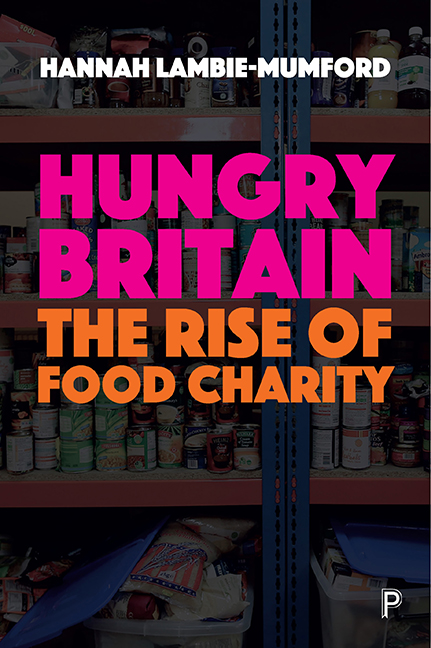Book contents
- Frontmatter
- Dedication
- Contents
- List of figures
- List of abbreviations
- Acknowledgements
- Foreword
- One Introduction
- Two Hunger and charitable emergency food provision in the UK and beyond
- Three Theories of the food insecurity ‘problem’ and the right to food ‘solution’
- Four Food charity: the ‘other’ food system
- Five The sustainability of food charity
- Six Food charity as caring
- Seven Food charity and the changing welfare state
- Eight Conclusion
- References
- Index
Foreword
Published online by Cambridge University Press: 05 April 2022
- Frontmatter
- Dedication
- Contents
- List of figures
- List of abbreviations
- Acknowledgements
- Foreword
- One Introduction
- Two Hunger and charitable emergency food provision in the UK and beyond
- Three Theories of the food insecurity ‘problem’ and the right to food ‘solution’
- Four Food charity: the ‘other’ food system
- Five The sustainability of food charity
- Six Food charity as caring
- Seven Food charity and the changing welfare state
- Eight Conclusion
- References
- Index
Summary
Is there a more vivid depiction of acute poverty than the terrifying food-bank scene in Ken Loach's award-winning drama I, Daniel Blake? One of the protagonists, a penniless and starving single mum, tears open a can of baked beans and in a frenzy of hunger stuffs the contents into her mouth with her fingers. This moment of acute desperation is where people end up, the film suggests, when you not only rip apart the social security safety net but also leave the vulnerable individuals who then fall through it precariously reliant on charity handouts to survive.
The food bank was a perfect location for Loach's film; it is emblematic of political and economic changes in the UK over the past decade. Most people had never heard of food banks in Britain in 2009; now there are thousands, all over the country. Food banks have been absorbed into mainstream political and cultural discourse as a kind of shorthand for poverty, the consequences of austerity and the punitive nature of neoliberal social security reform. There was widespread shock when the UK's biggest food-bank network, The Trussell Trust, began rapidly expanding at the beginning of this decade; ironic quips about food banks being a ‘growth industry’ in a time of recession mingled with incredulity and embarrassment that so many people in one of the world's wealthiest countries went hungry because they were too poor to feed themselves and their families.
Arguably, the initial shock at the rise of food banks in the UK (they have been around for much longer in Canada and the US) has subsided. It is entirely possible that, in media terms, we have reached a point of ‘peak food bank’. The appetite for news reports from the food charity frontline has diminished through repetition; how often, after all, can you keep telling the same awful story? Similarly, public outrage at the revelations of The Trussell Trust's annual audits (which, after early double-digit increases, show the volume of food given out each year to be roughly stabilising at enough to feed more than 1.1 million people) has faded slightly. As The Trussell Trust pointed out in 2016, there is a danger that reliance on food charity has become the ‘new normal’.
- Type
- Chapter
- Information
- Hungry BritainThe Rise of Food Charity, pp. ix - xiiPublisher: Bristol University PressPrint publication year: 2017



